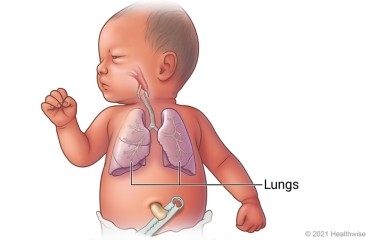Infant Respiratory Distress Syndrome: Care Instructions
Overview

Your baby has been treated for infant respiratory distress syndrome (IRDS). This is a serious breathing
problem. It can happen to premature babies who are born before their lungs are fully developed.
Normally a baby's lungs make a substance that helps the lungs fill with air. The lungs usually make this
substance close to the time of birth. Your baby's lungs did not make enough of this substance. This made it
very hard for your baby to breathe.
Babies who have IRDS need extra oxygen. And they may need to be on a ventilator. This machine helps your baby
breathe. To use the machine, the doctor puts a soft tube through your baby's mouth into the windpipe. Your
baby has been getting oxygen and medicine through the tube. This helped your baby's lungs get stronger.
The hospital staff will make sure that your baby is ready to go home. And they'll help you get the support
you need. A member of the staff will answer your questions about what will happen before and after your baby
leaves the hospital.
Follow-up care is a key part of your child's treatment and safety. Be sure to make and go to all
appointments, and call your doctor if your child is having problems. It's also a good idea to know your
child's test results and keep a list of the medicines your child takes.
How can you care for your child at home?
-
If your baby is sent home with oxygen, follow your doctor's directions for giving the oxygen.
-
Learn how to do rescue breathing. It is important to know this in case your baby stops breathing. Talk to
your doctor or take a class to learn how to do rescue breathing and infant CPR.
-
Follow instructions on using a breathing monitor at home if your doctor tells you to use one.
-
Do not smoke or allow anyone else to smoke in your house. Smoking increases the chance of sudden infant
death syndrome (SIDS), ear infections, asthma, colds, and pneumonia.
-
Wash your hands well before holding your baby. Keep your baby away from crowds and people who are sick.
-
Make sure your baby gets all recommended vaccines. Also, make sure anyone who comes near your baby has had
all of the recommended shots.
When should you call for help?
 Call 911
anytime you think your child may need emergency care. For example, call if:
Call 911
anytime you think your child may need emergency care. For example, call if:
Call your doctor now or seek immediate medical care if:
Watch closely for changes in your child's health, and be sure to contact your doctor if:
Current as of: October 24, 2023
Content Version: 14.0
Care instructions adapted under license by your
healthcare professional. If you have questions about a medical condition or this instruction, always ask
your healthcare professional. Healthwise, Incorporated disclaims any warranty or liability for your use of
this information.